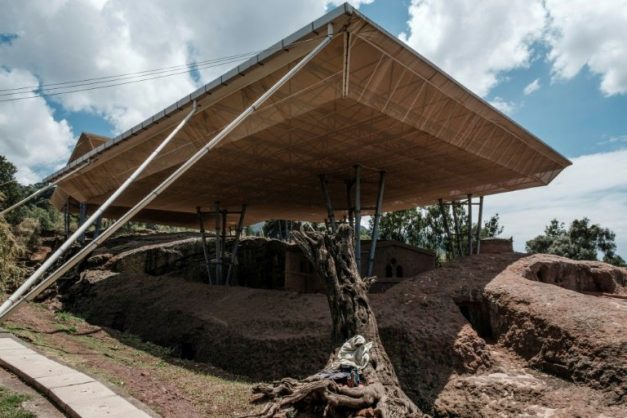AFP |
Priest Mekonnen Fatne stood among his Ethiopian Orthodox faithful, looking upon a nine-centuries-old church they feared could be wrecked at any minute. Over the church loomed a massive tarpaulin screen supported by a lattice of metal, one of four shelters erected to protect the northern Ethiopian town of Lalibela’s historic churches, but which residents worry — despite experts’ assurances — could obliterate them.
“If this were to collapse, do you think there would be any piece of the church left?” the priest asked, gesturing to the thick metal rods plunging into the red earth around Bete Maryam church. French President Emmanuel Macron is set to arrive in Ethiopia on Tuesday afternoon as the country grapples with the aftermath of a plane crash close to capital Addis Ababa, which killed all 157 people on board.
Lalibela residents sporting shirts reading “save Lalibela”, staged a protest over the churches’ condition, according to Negash.
Macron and Ethiopian Prime Minister Abiy Ahmed are scheduled to travel to Lalibela later this week, for a visit locals hope will result in a new plan, money and expertise for the complex’s renewal.
Designated a UNESCO World Heritage site in 1978, the Lalibela churches are unique. They are carved from rock and sit below ground level, surrounded by deep, dry moats, with only their roofs visible. The courtyards surrounding these extraordinary places of worship are reachable only by staircases and tunnels.
Read more: Saudi prince back on stage to Putin delight, Macron warning
Preservationists say the shelters erected in 2008 to keep rain off the churches pose no threat, but the structures have nonetheless become a symbol of the neglect Lalibela residents say they, and the complex, endure. “We are here because of the heritage,” said Yitibarek Getu, a deacon at the complex. “If there’s no heritage, imagine what will happen?”
Ancient History
Lalibela takes its name from King Gebre Mesqel Lalibela, a 13th-century leader who local lore holds built 11 churches with the help of angels after God ordered him to build a “New Jerusalem”. Located 680 kilometres (420 miles) north of Addis Ababa, Lalibela is a popular destination for foreign tourists and followers of the Ethiopian Orthodox faith — the country’s largest religion.
Ethiopian town of Lalibela’s historic churches, but which residents worry — despite experts’ assurances — could obliterate them.
The rock-hewn churches stand up to 15 metres (42 feet) tall, replete with ornate designs and windows carved in the shape of crosses, but their rock composition leaves them vulnerable to erosion from the intense downpours of Ethiopia’s rainy season.
The Italian-built shelters that protect some of the churches have earned the ire of residents who claim they are ugly and could collapse in strong wind. “It’s like revenge by the Italians!” Negash Adamu, a 27-year-old Lalibela resident, said in reference to Ethiopia’s repeated conflicts with Italian colonisers.
Read more: Macron, Merkel urge ‘full’ Ukraine ceasefire ahead of planned truce
Priests and worshippers at the complex complain the shelters’ heavy support pillars have damaged the underground Trinity chapel, its roof cracking under the weight of the support pylon. The chapel is not open to the public. Locals also worry about the soundness of the shelters, which came with a 10-year guarantee.
“We want a permanent restoration, and we want the shelter to be removed,” said Tsigieselassie Mazgebu, the complex’s parish priest. “There is a big possibility that if it falls on the treasure, it would demolish it.”
Lack of Trust
Last year, Lalibela residents sporting shirts reading “save Lalibela”, staged a protest over the churches’ condition, according to Negash. Hailu Zeleke Woldetsadik, director of cultural heritage conservation at Ethiopia’s Authority for Research and Conservation of Cultural Heritage, insisted there was no cause for alarm.
Locals also worry about the soundness of the shelters, which came with a 10-year guarantee.
He denied any damage had been done to the Trinity chapel and said the shelters were designed to stand safely beyond their 10-year warranty. “There is no imminent danger,” he told AFP, adding that the structures were designed to sway in heavy winds, rather than strain to the breaking point.
Read more: ‘Yellow vest’ protesters target Macron’s holiday hideaway
Kidanemariam Woldegiorgis, an archaeologist who grew up in Lalibela, blamed the controversy on a lack of consultation with town residents, which stoked suspicion. “It’s not clear, it’s not transparent what they are doing,” he said.
Hailu said Abiy and Macron will sign an agreement for the temporary shelters’ maintenance and the hiring of scientists to look into permanently restoring damaged churches. This could pave the way for the shelters’ replacement with lighter structures, possibly ones that can open and close depending on the weather, while repairs are done.
© Agence France-Presse














